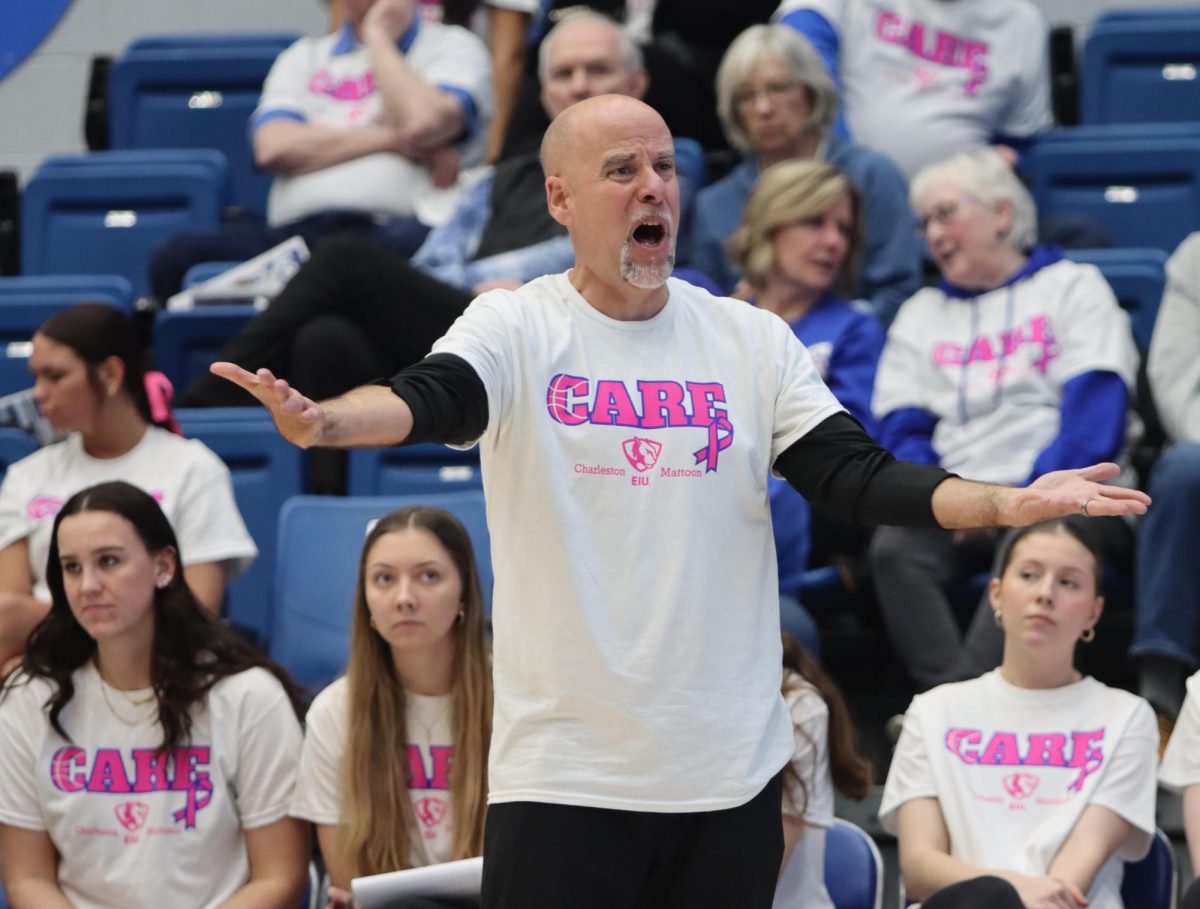Teacher manages job despite disability
It is hard to imagine what you have until you have to go
without it. Eastern history professor Martin Hardeman learned
that lesson 15 years ago after contracting a viral infection
that claimed his eyesight.
Now, without the benefit of vision, all Hardeman can do is
imagine.
“Being blind is exactly what people think it is,” he said.
“Unfortunately for me, I’m a very visual person. I used to love
going to movies a lot, and I miss the pleasure of watching
girls in their summer dresses.”
While he was teaching at Roosevelt University in Chicago 15
years ago, Hardeman developed the infection, which he said is
typically found in dogs.
“I naturally developed some hard feelings toward dogs after
that,” Hardeman said jokingly.
Hardeman said he never really saw that well to begin with, but
he still found the first few days disorienting and does not
remember too much immediately after it happened.
“There is an ongoing period of frustration,” Hardeman said.
“There are a number of things you obviously can’t do. I
obviously can’t drive or see movies or see people’s faces. But
on the other hand, I don’t have to watch students fall asleep
in the back of the classroom.”
A few months later, Hardeman found himself back in the
classroom and had to reteach himself how to do many of the
things required of him.
“The thing about teaching is that it is pretty cut and dry,” he
said. “You walk through the door, find the desk and stand in
front of a podium and talk to students. And occasionally you
write on the board.
“I had to memorize my lecture notes and try to remember as much
as possible, but I try not to be so rigid that I can’t answer
any questions. I have a reader/researcher who reads most of the
tests and papers. She puts down comments for me. My assistants
are people that I have a great deal of confidence in.”
Joy Pratte, of the faculty support staff, has been Hardeman’s
assistant for the past year. She is essentially Hardeman’s
eyes.
“I am his Tonto,” she said. “I read for him, help him grade
papers, check his E-mail and pick up his lunch. Basically I do
anything he needs sight to do. He is so easy to get along with.
He is a very ethical person who cares about education and he
has a wicked sense of humor.”
While Pratte is there to help with tasks outside of class,
Hardeman relies on his sixth sense to help him in class.
“I have already revealed there is nothing mystical about being
blind, but blind people have a sixth sense,” he said. “Yes, I
do have some problems in class. I memorize the names of all of
my students and call on them from time to time. If they do not
answer, they are not there. I don’t require attendance, but I
require participation so if someone is not there they can’t
participate and I record it in my golden memory book and it
reappears when it comes time for grades.”
Hardeman has a reputation on campus as being a tough grader,
but Pratte said from what she sees, he sometimes goes easy.
“Students may think he is a really hard professor, but from
reading his papers, he is often times not as hard as he should
be,” she said. “He doesn’t know who’s paper it is that he is
grading so he grades strictly on content.”
Hardeman has been teaching history at Eastern for the past nine
years after stints at Roosevelt, Kenyon College in Ohio and St.
Thomas in Houston. After studying political science at the
University of Chicago, Hardeman realized he needed to try
something different.
“I wanted to become a lawyer or join the state department,”
Hardeman said. “I think I was watching too much `Perry Mason.’
I found out I was not cut out to be a lawyer although I did
marry one.
“I discovered I hated political science, or at least the kind I
was studying. My G.P.A. was 2.1 in political science, while my
G.P.A. in history was 3.9. I said to myself, `there is
something wrong with these numbers.’ There is something about
the past that draws us in.”
After going 15 years without being able to see anything, there
is a lot of stuff Hardeman misses doing, but rather than feel
sorry for himself, Hardeman chose to accept what happened to
him and says life is enjoyable for him right now.
“I am a professional observer,” he said. “The human comedy is
just that, wonderful to observe and occasionally wonderful to
participate in. That is as close to a philosophy as I have.”












































